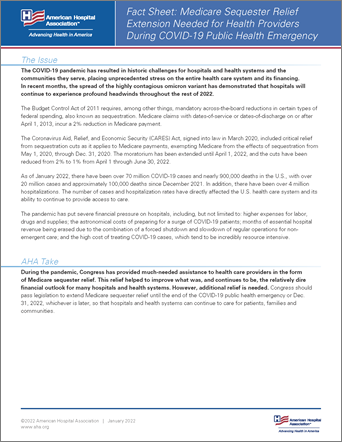Fact Sheet: Medicare Sequester Relief Extension Needed for Health Providers During COVID-19 Public Health Emergency
January 2022
The Issue
The COVID-19 pandemic has resulted in historic challenges for hospitals and health systems and the communities they serve, placing unprecedented stress on the entire health care system and its financing. In recent months, the spread of the highly contagious omicron variant has demonstrated that hospitals will continue to experience profound headwinds throughout the rest of 2022.
The Budget Control Act of 2011 requires, among other things, mandatory across-the-board reductions in certain types of federal spending, also known as sequestration. Medicare claims with dates-of-service or dates-of-discharge on or after April 1, 2013, incur a 2% reduction in Medicare payment.
The Coronavirus Aid, Relief, and Economic Security (CARES) Act, signed into law in March 2020, included critical relief from sequestration cuts as it applies to Medicare payments, exempting Medicare from the effects of sequestration from May 1, 2020, through Dec. 31, 2020. The moratorium has been extended until April 1, 2022, and the cuts have been reduced from 2% to 1% from April 1 through June 30, 2022.
As of January 2022, there have been over 70 million COVID-19 cases and nearly 900,000 deaths in the U.S., with over 20 million cases and approximately 100,000 deaths since December 2021. In addition, there have been over 4 million hospitalizations. The number of cases and hospitalization rates have directly affected the U.S. health care system and its ability to continue to provide access to care.
The pandemic has put severe financial pressure on hospitals, including, but not limited to: higher expenses for labor, drugs and supplies; the astronomical costs of preparing for a surge of COVID-19 patients; months of essential hospital revenue being erased due to the combination of a forced shutdown and slowdown of regular operations for nonemergent care; and the high cost of treating COVID-19 cases, which tend to be incredibly resource intensive.
AHA Take
During the pandemic, Congress has provided much-needed assistance to health care providers in the form of Medicare sequester relief. This relief helped to improve what was, and continues to be, the relatively dire financial outlook for many hospitals and health systems. However, additional relief is needed. Congress should pass legislation to extend Medicare sequester relief until the end of the COVID-19 public health emergency or Dec. 31, 2022, whichever is later, so that hospitals and health systems can continue to care for patients, families and communities.


